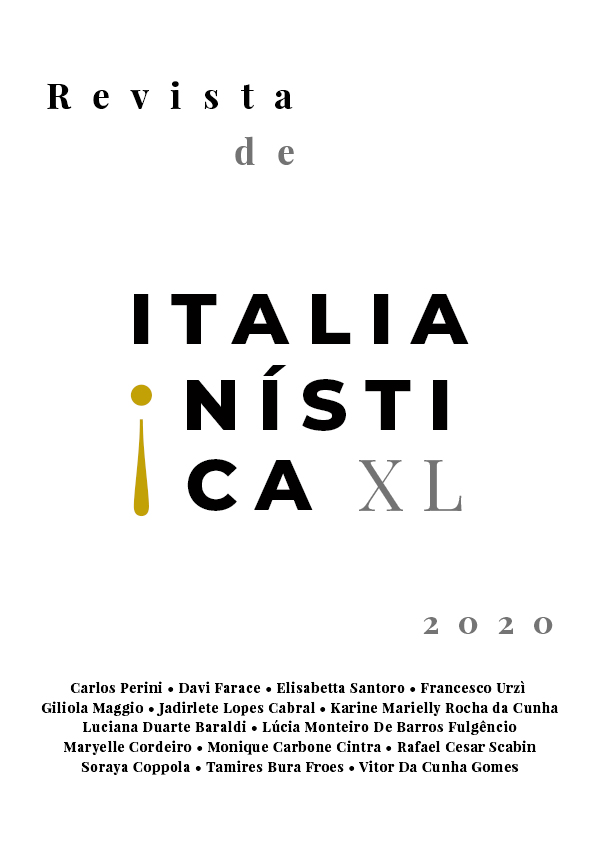“Ciao aqui é oi”: Language Learning and On-line Socialization during Pandemic
DOI:
https://doi.org/10.11606/issn.2238-8281.i40p44-66Keywords:
Teletandem, Covid-19, Italian as a Foreign Language, Portuguese as a Foreign Language, SocializationAbstract
Covid-19 pandemic has changed people’s life on a world scale and made everyone, at some point, rethink their social and labor practices. Teaching strategies linked to the use of digital information and communication technologies (ICTs) – which have been known for some time now, but little explored and effectively integrated with didactic practices - started to get attention and gain importance only when it was realized that remote teaching would become predominantly the only solution to continue both teaching and learning during pandemic. In this work, we present the constitution and development of two telecollaboration learning projects – in which two speakers of different languages help each other in order to improve the language in which the other is proficient – between Università degli Studi di Perugia and Universidade Federal do Paraná. The pilot project was developed in the second half of 2019 and the project "Ciao aqui é oi: Teletandem interactions between Brazil and Italy” in March and April 2020. We start by presenting theoretical aspects as well as contextualizing Teletandem in Brazil. Then, we talk about the project as a possibility of training in the Italian context and of extracurricular activity in Brazil. We briefly analyze the psychological and socialization implications that the “Ciao aqui é oi” project provided to participating students during lockdown. Finally, we present our reflections on the most relevant moments pointed out by the students in the “interaction reports”, delivered after each session, and make our final considerations.
Downloads
References
ARANHA, S. & CAVALARI, S. M. S. A trajetória do projeto Teletandem Brasil: da modalidade institucional não-integrada à institucional integrada. In: The ESPecialist. Disponível em https://repositorio.unesp.br/bitstream/handle/11449/122298/ISSN0102-7077-2014-35-02-70-88.pdf?sequence=1&isAllowed=y. Acesso em 20/08/2020.
BRASIL. Ministério da Educação. Conselho Nacional de Educação. Câmara de Educação Superior. Resolução nº 7, de 18 de dezembro de 2018. Disponível em: <https://www.in.gov.br/web/dou/-/resolucao-n-7-de-18-de-dezembro-de-2018-55877677?inheritRedirect=true>. Acesso em 15/09/2020.
BITTER, G. G.; LEGACY, J. M. Using technology in the classroom. Boston, MA: Allyn & Bacon, 2008.
BROOKS, S., WEBSTER, R., SMITH, L., WOODLAND, L., WESSELY, S., REENBERG, N., & RUBIN, G. The psychological impact of quarantine and how to reduce it: Rapid review of the evidence. The Lancet, Volume 395, ISSUE 10227, 14 de março de 2020. DOI: https://doi.org/10.1016/S0140-6736(20)30460-8.
CALDAS AULETE, Dicionário da Língua Portuguesa. Disponível em : http://www.aulete.com.br/. Acesso em 10/09/2020.
CANDIDO, J. Teletandem: sessões de orientação e suas perspectivas para o curso de letras. Dissertação (Mestrado em Estudos Linguísticos) - Instituto de Biociências, Letras e Ciências Exatas da Universidade Estadual Paulista, São José do Rio Preto, 230f., 2010. Disponível em: https://repositorio.unesp.br/handle/11449/99824
EGBERT, J. The New Normal?: A pandemic of task engagement in language learning. Foreign Language Annals, n. 53, p. 314– 319, 20 Jun. 2020. DOI: https://doi.org/10.1111/flan.12452 .
GARCIA, D. N. M. Teletandem: Acordos e negociações entre os pares. Tese (Doutorado em Estudos Linguísticos) - Instituto de Biociências, Letras e Ciências Exatas da Universidade Estadual Paulista, São José do Rio Preto, 290f., 2010. Disponível em: https://repositorio.unesp.br/handle/11449/103528
MAZZA, C.; RICCI, E.; BIONDI, S.; COLASANTI, M.; FERRACUTI, S.; NAPOLI, C.; ROMA, P. A Nationwide Survey of Psychological Distress among Italian People during the COVID-19 Pandemic: Immediate Psychological Responses and Associated Factors. International journal of environmental research and public health, v. 17, n. 9, p. 3165, 2020. DOI: http://doi.org/10.3390/ijerph17093165.
TELLES, J. A.; VASSALLO, M. L. Ensino e aprendizagem de línguas em Tandem: princípios teóricos e perspectivas de pesquisa. In: TELLES, J. A. (org.). Teletandem. Um contexto virtual, autônomo e colaborativo para aprendizagem de línguas estrangeiras no século XXI. Campinas: 2009, p. 21.
SARSINI, D. Alcune riflessioni sulla didattica a distanza. Studi sulla Formazione/Open Journal of Education, v. 23, n. 1, p. 9-12, 5 Jul. 2020. DOI: https://doi.org/10.13128/ssf-11826.
WANG, C.; PAN, R.; WAN, X.; TAN, Y.; XU, L.; HO, C. S.; HO, R. C. Immediate Psychological Responses and Associated Factors during the Initial Stage of the 2019 Coronavirus Disease (COVID-19) Epidemic among the General Population in China. International journal of environmental research and public health, 17(5), 1729, 2020. DOI: https://doi.org/10.3390/ijerph17051729.
Downloads
Published
Issue
Section
License
Copyright (c) 2020 Revista de Italianística

This work is licensed under a Creative Commons Attribution-NonCommercial-NoDerivatives 4.0 International License.
A revista retém os direitos patrimoniais dos artigos e os publica simultâneamente sob uma Licença Creative Commons-Atribuição-Não Comercial-Sem Derivações.



